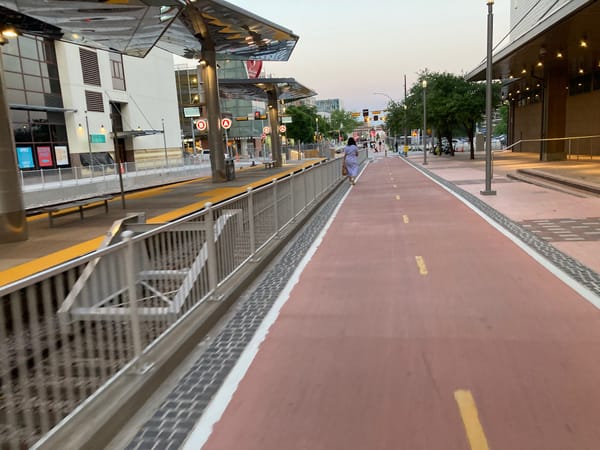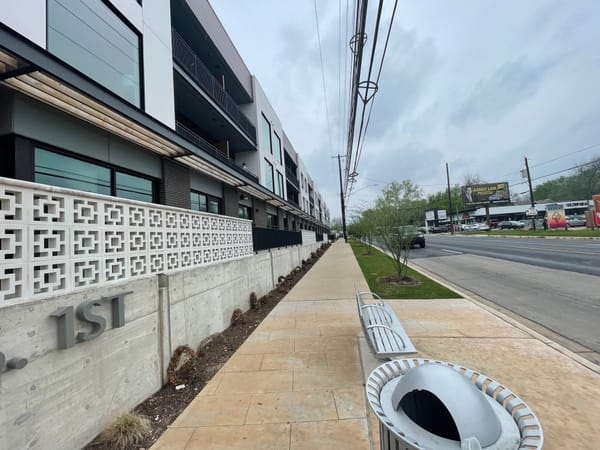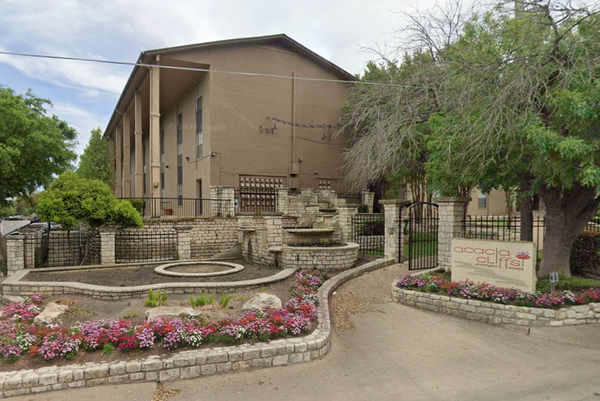A big crowd against a bigger highway
Few city issues draw a crowd. Highway expansion did.

On Sunday hundreds showed up for the "Wider Won't Work" rally against the I-35 expansion near Sanchez Elementary. I wasn't on scene, but fortunately Nathan Bernier of KUT was:
A rally against the I-35 is expansion in Austin is happening now at Sanchez Elementary school. Featured speakers include council members Zo Qadri, José Velásquez and Mayor Pro Tem Paige Ellis. pic.twitter.com/sGlDC5X0fm
— Nathan Bernier (@KUTnathan) November 5, 2023
The biggest catch for Rethink35 was Greg Casar. I was wondering if/when Austin's most prominent progressive would speak out on the matter. The freshman congressman told the crowd it reflected "an incredible surge of hope and of energy."
"I thought back to over eight years ago when I became an Austin City Council member, and there wasn't a majority of us standing up against an I-35 expansion, there wasn't a rally of hundreds of people ready to stand up against TxDOT," he said. "This movement has grown so much, it's brought so many people together and together, I know we can win."
The momentum for this movement unfortunately kicked off far too late. However, there still is a chance that the CAMPO transportation policy board could vote to delay funding for the project until the completion of two emissions studies. These studies may offer the opportunity for CAMPO (the regional planning organization that determines how federal transportation dollars get spent) to apply for federal grants to mitigate the negative effects of the expansion. That could mean more money for highway caps, which would be a major relief to local taxpayers.
Whether or not anything comes of this, that a rally opposing a highway expansion could draw so many people reflects a political change that could very well threaten Mayor Kirk Watson's re-election if a credible opponent (a huge if) wants to run. Watson, who has taken credit for securing the funding for the expansion during his time in the Texas Senate, clearly recognizes that the expansion has become a liability rather than an asset because he has been so quiet about it, even if he has consistently voted against any efforts to slow down or change the project.
There's a lazy assumption that because most Austinites drive, most of them will support a highway expansion. But do you think most Austinites are looking forward to the prospect of a 6-10 year construction project on I-35? Do they actually believe it will improve their quality of life? And what if they're told that highway expansions don't actually reduce congestion?
The greater threat to Watson is not necessarily that a majority of voters might be against him, but that the passion on this issue belongs entirely to the opposition. If he draws a credible opponent, particularly a woman, this issue could be a crucial distinction for progressive voters. In a presidential election year, very few voters will be paying much attention to city issues, but a highway expansion backed by the Republican state government in an era of heightened anxiety about climate change is not something he's going to want to have to defend on the campaign trail.
My money would still be on Watson not drawing a strong opponent, but if anybody wants to run, this might be a good issue to run on.
An exalted 'third space' in Bouldin
I finally got around to watching a discussion from two weeks ago at the Planning Commission over the proposed rezoning of the High Road on Dawson, an event space and pool in Bouldin Creek.
The 3.7 acre property was an Elks Lodge until 10 years ago, when the national Elks tried to boot the Austin chapter –– an act of aggression the locals claimed was retaliation for electing a woman 'Exalted Leader' of their lodge. Like many declining fraternal social orgs, the Elks have generally been a few steps behind the mainstream when it comes to racial and gender inclusion.
Thus began a lengthy court battle, during which the locals seceded from the national organization and renamed the property the High Road on Dawson, which they operated both as kind of low-cost private pool club and an event space for meetings, community groups etc. Unfortunately, the national Elks won in court and were able to kick the feminist rebels off the land, which they eventually sold to the family that owns Terry Black's BBQ.
So now the Black family wants to revive the property, which has sat vacant for several years. They want to re-establish membership-based access to the pool and club, but they also want to add a boutique hotel and restaurant.
The property is actually zoned for single-family residential (SF-3). The Elks and later the High Road were only allowed to engage in revelry on the land as nonprofits –– a for-profit biz requires a zoning change to do the same.
A representative of the Bouldin Creek Neighborhood Association came to speak against the zoning change, voicing concerns about increased traffic, lighting, sound and BBQ pit smoke, but it appeared to be pretty tepid opposition for a zoning case.
City staff also opposes the requested zoning, leaning on the city's car-centric code to argue against the inclusion of an "intense" commercial use in a "residential area." The applicant's envisioned business, said zoning case manager Sherri Sirwaitis, is more appropriate for an arterial roadway –– Dawson "doesn't have the capacity for this type of development."
In this instance, city staff is making a value statement but framing it as scientific fact. Whether Dawson is an appropriate location for a hotel and restaurant is a matter of opinion based on your views on urban planning. City staff is being faithful to Austin's car-centric "Euclidian" land development code, which is anchored in the belief that residential and commercial uses shouldn't mix and anything that slows down car traffic on a street is a public nuisance.
Unsurprisingly, the YIMBY contingent on the Planning Commission, at least two of whom have UT planning degrees and one of whom is a transportation planner, came to the opposite conclusion.
"It hurts me to think that we want wider roads for people to access places like this," said Greg Anderson. "Because there's no need for that. This is a great space and if you have slower-moving vehicles that's actually great for the people accessing it by bike or foot."
Others discussed the importance of "third spaces" in communities. This is just planning-speak for stuff besides home and work where people hang. Restaurants, bars, churches, community centers, parks, libraries etc.
The commission stumbled into a few tense moments after Grayson Cox suggested that a pool would not be much of an asset in a "wealthy neighborhood" like Bouldin because so many people already have their own pools.
That prompted a correction from Nadia Barrera-Ramirez ("not everyone in Bouldin has a pool") and an impassioned response from Felicity Maxwell, who was a member of the High Road club and said that there was wide support in the area to bring back the club use.
Former Statesman columnist Alberta Phillips, a newcomer appointed by Mayor Kirk Watson, voiced skepticism of the value of a for-profit venue.
"There's no free thing for people to do here, so what kind of a third space does that make this in reality?" she asked.
Well, one of the reasons I love our libraries so much is that they are one of the few places that don't require commercial consumption to access, but they're the exception in a market economy, not the rule.
Phillips also suggested the neighbors' objection was the "boutique hotel." Maybe, but I doubt they'd be more excited about a Motel 6.
Anyway, after Phillips concluded her remarks Jessica Cohen, who is a non-voting representative of the Board of Adjustment, raised a point of order, ostensibly in response to a few of YIMBY colleagues seated nearby:
"Because I'm starting to get a little pissed off over here. This is the Planning Commission. Snide remarks, smiles, jokes, just because you don't agree with someone doesn't mean you don't maintain decorum. Please show a little respect."
The commission ultimately voted in favor of recommending the zoning change sought by the Black family, who insists, by the way, that they have no intention of operating BBQ pits on the property. Cox, Phillips and Jennifer Mushtaler dissented.




